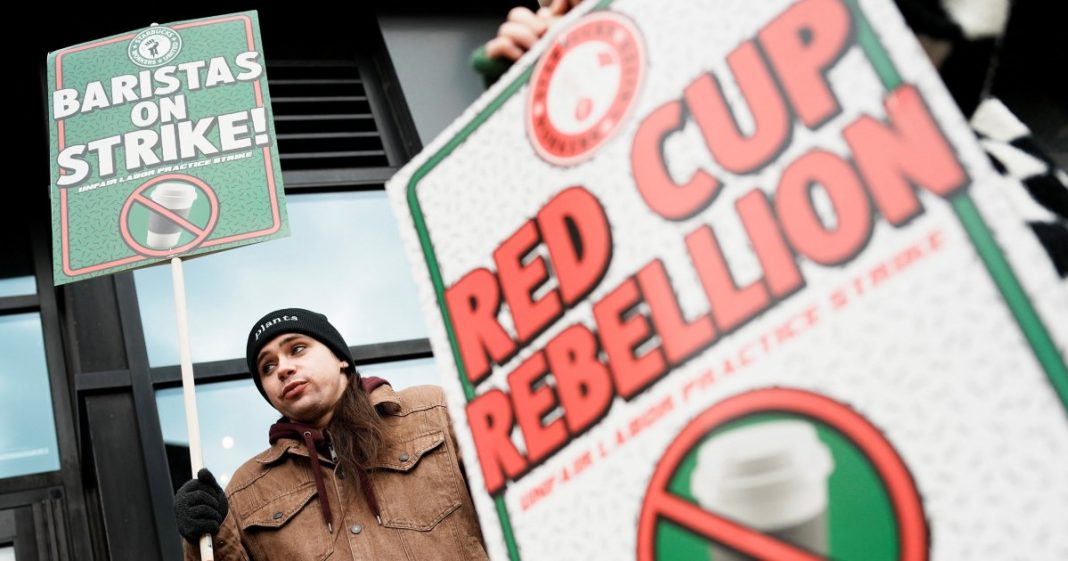Key Takeaways
- Over 1,000 Starbucks workers strike at 65 stores during Red Cup Day
- Protest targets stalled labor negotiations since April
- Workers demand better pay, hours, and resolution of unfair labor charges
- Starbucks maintains most stores remain open and operations normal
More than 1,000 unionized Starbucks workers launched strikes at 65 U.S. stores on Thursday, targeting the company’s popular Red Cup Day promotion. The labor action protests stalled contract negotiations that haven’t seen progress since bargaining stopped in April.
Starbucks Workers United organized the walkouts across 45 cities including New York, Philadelphia, Seattle, and Dallas. The union confirmed some stores had already closed due to the strike, with more potential closures expected throughout the day. Organizers described the action as open-ended, with additional unionized stores prepared to join if contract talks don’t resume.
The coffee giant responded that the “vast majority” of its 10,000 company-owned U.S. stores remained open and operating normally. By noon Eastern Time, Starbucks reported being “on track to meet or exceed” sales expectations for Red Cup Day, calling the day “off to an incredible start.”
Contract Negotiations Stalled
Workers are protesting Starbucks’ failure to reach a contract agreement with the union. The labor movement began in 2021 when Buffalo store employees voted to unionize. Despite a December 2023 commitment to finalize agreements by end of 2024, progress stalled after CEO Laxman Narasimhan’s departure in August last year.
The union claims negotiations have halted under current CEO Brian Niccol, with no bargaining sessions since April. Around 550 company-owned Starbucks locations have unionized, though the company closed 59 unionized stores in September as part of broader restructuring.
Worker Demands and Conditions
Striking employees are demanding:
- Higher wages and improved staffing levels
- Consistent hours exceeding 19 hours weekly for benefits eligibility
- Resolution of hundreds of unfair labor practice charges
Barista Dochi Spoltore from Pittsburgh explained the hourly struggle: “I make $16 per hour and it’s hard to get more than 19 hours per week. We’re proud of our work, but we’re tired of being treated like we’re disposable.”
Workers highlighted the contrast between their compensation and executive pay, noting the company spent $81 million on a Las Vegas conference for managers in June.
Company’s Position on Compensation
Starbucks defends its compensation package as “the best in retail,” valuing it at approximately $30 per hour including benefits. The company offers up to 18 weeks of paid family leave and full tuition coverage for four-year degrees.
In a recent employee letter, Chief Partner Officer Sara Kelly stated the union walked away from spring negotiations. She expressed Starbucks’ readiness to resume talks and “move quickly to a reasonable deal,” while noting the company’s barista turnover rates are half the industry average.
Strategic Timing and Impact
This marks the third consecutive year workers have targeted Red Cup Day, one of Starbucks’ busiest promotional events. Last year’s five-day pre-Christmas strike closed 59 stores.
Labor expert Todd Vachon from Rutgers University explained the strategy: “Unlike manufacturers, retail industries depend on employee-customer connections. That makes shaming a potentially powerful weapon in the union’s arsenal.”
Business Performance Context
Despite the labor disruption, Starbucks reported improving financials. Same-store sales grew 1% in the July-September period—the first increase in nearly two years. The company recently saw such strong demand for holiday merchandise that its Bearista cups sold out immediately upon release.
Under Niccol’s leadership, Starbucks has implemented new hospitality standards, store redesigns, and staffing adjustments to better handle peak hours while prioritizing in-store orders over mobile ones.




